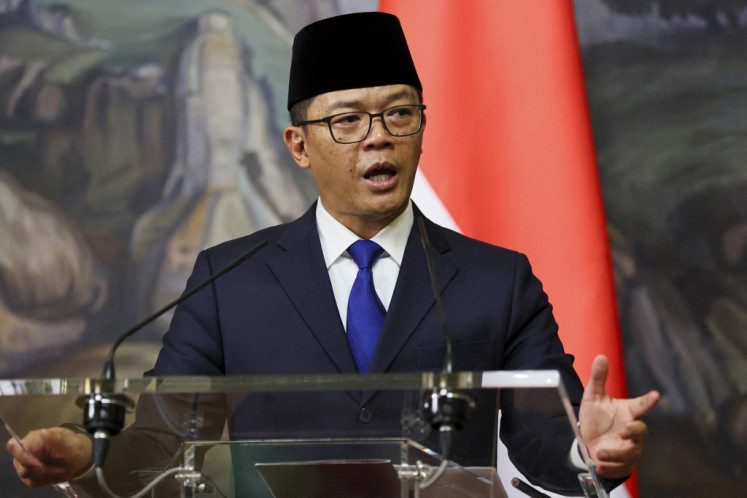Popular Reads
Top Results
Can't find what you're looking for?
View all search resultsPopular Reads
Top Results
Can't find what you're looking for?
View all search results'Jakarta administration has no clue about ecological city management'
âGreen Citiesâ, the theme of this yearâs Earth Day, is a popular term for what activists and scholars call an ecological city
Change text size
Gift Premium Articles
to Anyone

'Green Cities', the theme of this year's Earth Day, is a popular term for what activists and scholars call an ecological city. The Jakarta Post's Sebastian Partogi talks to Marco Kusumawijaya about the issue. Marco is the founder and director of Ruang Jakarta Center for Urban Studies, an NGO focusing on urban issues. Following are excerpts of the interview:
Question: What is the exact definition of an ecological city?
Answer: Putting it briefly, an ecological city is one that minimizes the use of energy and places maximum effort on renewing utilized energy. By taking these actions, we help the environment to renew its resources. On the other hand, when we exploit non-renewable energy indefinitely, we have done two things: caused a depletion of natural resources and polluted the environment. As a result, the environment has gradually lost its capacity to sustain our lives ' we have seen so many species being extinct because of this.
The huge volume of solid waste has always been a problem in Jakarta. According to data from February 2013, the city produced approximately 6,500 tons of garbage every day. What actions should we take to deal with this problem?
So far, Jakartans have been handling solid waste incorrectly. Ideally, we should not dispose of organic waste but recycle it into compost fertilizer instead and get rid of non-organic waste in its entirety.
Actually, as a big capital city, Jakarta is still quite fortunate because some 60 percent of its solid waste production is still organic and, thus, biodegradable. In advanced countries, organic waste represents only some 30 percent of its solid waste production. What we should do now is to get rid of plastic consumption in favor of a biodegradable material and transform all of the organic waste into compost fertilizer so as to renew its utilization.
In your opinion, have we handled solid waste properly?
The way we handle solid waste is still very primitive. I think the Jakarta administration has no clue about ecological city management. We, for example, we still use trucks, which utilize non-renewable fuel as its source of energy, to transport waste to its final dumping site.
Another problem is the use of incinerators to get rid of waste. According to [environmental engineer] Yuyun Ismawati, who won the Goldman Environmental Prize in 2009, no matter how technologically advanced the incinerators are and how high up in the air they are located, they still continue to produce gas emission.
Furthermore, the incinerators run counter to the core definition of an ecological city because they utilize a lot of energy to get rid of solid waste. It takes a lot of energy resources to burn the waste placed inside an incinerator. By doing this, we exacerbate the already existing air pollution instead of alleviating it.
You mentioned air pollution, also one of Jakarta's most pressing environmental problems. How should we deal with this?
One of the major contributors to our current level of air pollution is because of our poor spatial planning. A lot of people from cities adjacent to Jakarta are working in the capital city, therefore, having to commute using motor vehicles ' think about the emissions produced by the vehicles. To overcome this, the spatial planning agencies must make it possible for people to live near their workplace, thereby, reducing their use of motor vehicles.
Another sad thing is the city's already scarce green open spaces, which act as a buffer to air pollution, are exploited for the construction of hotels, apartments or shopping malls.
Does the poor management of solid waste and air pollution reflect the Jakarta administration's low commitment to ecological city management?
I don't know anything about the city administration's commitment. To get a fair picture of the issue, you need to interview them and ask them directly. The only thing I know is that the current administration has no clue about ecological city management and this lack of knowledge is reflected in the inefficient way they use to manage our trash, which I have mentioned earlier.
Instead of spending the regional budget on the procurement garbage trucks or incinerators, the city administration can use the money to inform Jakartans on how to transform organic waste into compost fertilizer and provide them with the tools necessary to do so. The administration also needs to find ways to reduce plastic. This is where NGOs can play their role between the government and the citizens. We must sit down together to formulate actions that should be taken to create an ecological city.









